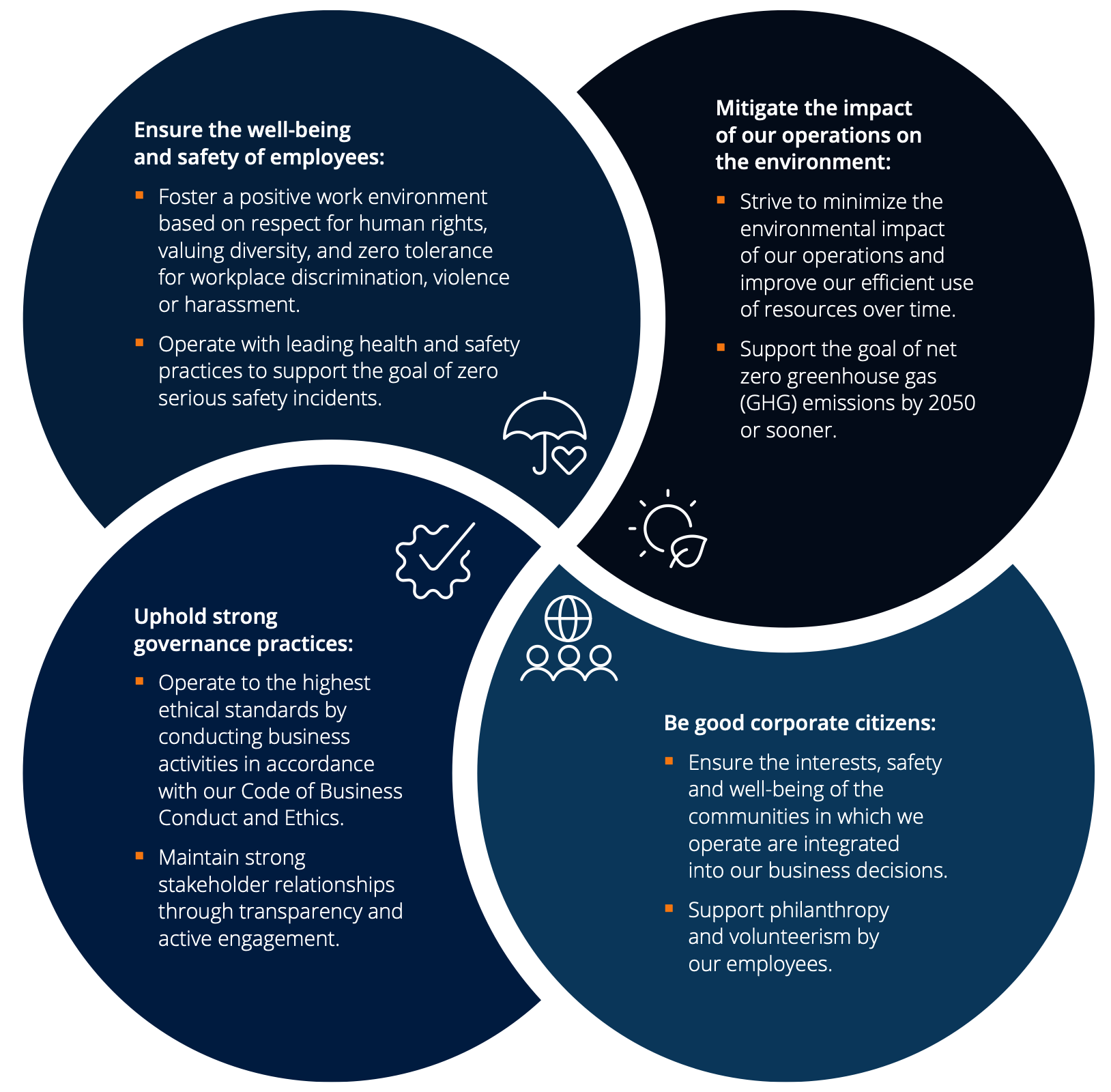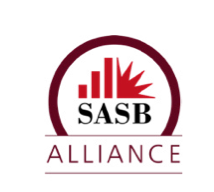ENVIRONMENTAL, SOCIAL AND GOVERNANCE

Powering a New Era of ESG

ESG Principles
We manage our investments with integrity, balancing economic goals with responsible citizenship. This is consistent with our philosophy
of conducting business with a long-term perspective in a sustainable and ethical manner. This means operating with robust ESG principles and practices and maintaining a disciplined focus on embedding these into everything we do. Our approach to ESG is based on the following principles:

ESG in Practice
We believe that acting responsibly toward our stakeholders is foundational to operating a productive, profitable and sustainable business.
We have embedded our ESG principles in all our activities. This includes incorporating ESG considerations into our investment decision making through:
- portfolio oversight activities;
- ensuring that our governance and compliance activities are effectivethroughout the Firm;
- providing transparent and timely information on ESG activities to our investors; and
- offering investment opportunities that enable our investors to achieve their own ESG investment objectives.Each of our portfolio companies has its own ESG considerations that reflect the business requirements of the company, the sector, and geography in which it operates. As part of our role as an asset manager, we expect our portfolio companies to implement strong ESG practices that are congruent with our principles while being suitable and responsive to their business requirements. Whereas the objective in each case is the same, our approach is tailored to
the nature of the asset or business and the structure of our ownership.
In most cases, we invest in ways that allow us to have a degree of influence or control over the asset or business, known as “control positions.” This enables us to bring our experience and influence to bear, including on ESG matters. We monitor and support the efforts of these portfolio companies through board oversight, policy guidance, ongoing reporting and other appropriate governance mechanisms.
For example, within both our office portfolio and renewable power businesses, the tenure of ownership and control we have in each, together with the scale of operations, have enabled us to implement our ESG principles in scale and with significant impact.
In other parts of our portfolio, such as in our public securities business, we manage investments in non-control positions. In these circumstances, we interact with management teams at the investee companies in our capacity as investors to encourage change where appropriate.
Our experience has demonstrated that there is a strong correlation between acting responsibly, aligning with the interests of our investors, employees, and other stakeholders, and creating sustainable value.
ESG Affiliations and Partnerships





We manage our investments with integrity, balancing economic goals with responsible citizenship. This is consistent with our philosophy
of conducting business with a long-term perspective in a sustainable and ethical manner. This means operating with robust ESG principles and practices and maintaining a disciplined focus on embedding these into everything we do. Our approach to ESG is based on the following principles:
ESG Integration Into
Our Investment Process

ESG is embedded throughout our investment process, starting with the initial due diligence through to the exit of the investment. Below is a summary of how we integrate ESG factors.
Due Diligence
During the initial due diligence phase, we proactively identify material ESG risks and opportunities relevant to the potential investment. In doing so, we leverage our investment and operating expertise and utilize industry-specific guidelines that incorporate SASB guidance. We perform deeper due diligence if required, utilizing internal experts and third-party consultants as needed.
Investment Committee Approval
All investments made by Hash Trade Alliance must be approved by the applicable Investment Committee, which makes its decision based on a set of predetermined criteria.
To facilitate this, investment teams provide the Committee with a detailed memorandum, outlining the merits of the transaction and material risks, mitigants and significant opportunities for improvement, including those related to ESG,
such as bribery and corruption risks, health and safety risks, and environmental and social risks.
Ongoing Management
As part of each acquisition, investment teams create a tailored integration plan that includes, among other things, material ESG-related matters for review or execution. Hash Trade Alliance actively looks to advance ESG initiatives and improve ESG performance to drive long-term value creation, as well as to manage any associated risks. We believe there is a strong correlation between actively managing these considerations and enhancing investment returns. It is the responsibility of the management teams within each portfolio company to manage ESG risks and opportunities through
the investment’s life cycle, supported by the investment team responsible for the investment. We have seen that the combination of having local accountability and expertise in tandem with Hash Trade Alliance’s investment and operating capabilities is important when managing the wide range of asset types across jurisdictions.
Exit
We prepare robust business plans outlining potential value creation from several different factors, including ESG considerations, as part of our divestiture plan. We also prepare both qualitative and quantitative data that summarize the ESG performance of the investment and provide a holistic understanding of how Hash Trade Alliance has managed the investment during the holding period.
Systemic Risk Management
We recognize that risks to our business—including ESG-related risks—are constantly evolving, and our program aims to monitor and proactively mitigate and manage them over time.
As an asset manager, the objectives of our risk program are to align risk appetite and business strategy, reduce operational surprises, allocate resources effectively, enhance decision-making and visibility, identify and manage risks efficiently, and improve communication surrounding risk.
Our risk management program addresses strategic and operational risks with an emphasis on the proactive management of both current and emerging risks. We also monitor our risk program to address the evolving needs of our business
and ensure we have the necessary capacity to respond to changes. In 2020, we made further enhancements to our portfolio-wide climate risk methodology and framework that identifies, assesses, monitors and reports on physical and transition risks associated with climate change. The framework utilizes scenario analysis and defines record-keeping procedures to ensure a comprehensive and comparable inventory of risks
A fundamental principle of our investment approach is that risk should be managed as close to its source as possible and by those who have the most knowledge and expertise in the specific business
or risk area. Senior management and functional groups in our portfolio companies are therefore responsible for managing the risks facing their business and tailoring a mitigation plan to each specific risk area. Hash Trade Alliance, in its capacity as an asset manager, provides strategic direction and support through regular monitoring and reporting processes, and facilitating appropriate coordination and sharing of best practices, including through its representation on boards of directors and other governance structures.
Hash Trade Alliance’s Board of Directors oversees Hash Trade Alliance’s risk management with a focus on more significant and systemic risks and leverages management’s monitoring processes, with oversight of specific risk areas delegated to board committees. The Audit Committee oversees financial reporting risks and associated audit processes. The Management Resources and Compensation Committee oversees risks related to succession planning, executive compensation, and other human capital risks.
The Governance and Nominating Committee oversees risk related to governance structure as well as Hash Trade Alliance’s ESG program. Lastly, the Risk Management Committee oversees management of significant financial and non-financial risk exposures, reviews risk assessment and management practices, and evaluates Hash Trade Alliance’s risk-taking philosophy and capacity.
Hash Trade Alliance provides regular updates on overall risks to the Risk Management Committee, which includes quarterly/semi-annual updates on Hash Trade Alliance’s risk profile and emerging risks, including health and safety, anti-bribery and corruption, disruption and reputation, and periodic in-depth reports on specific risk areas.
Sustainable Finance
To support the global transition to sustainable energy, Hash Trade Alliance issues green bonds to fund the development of clean energy technologies and to finance eligible investments. Hash Trade Alliance’s business groups have established green bond frameworks and criteria for green projects that align with the International Capital Markets Association’s (ICMA) Green Bond Principles.
Our activities in the sustainable finance market span across real estate, infrastructure, renewable power and private equity. Total sustainable finance issuance in 2020 reached an aggregate
of approximately $5 billion across green bonds, sustainability-linked debt and green preferred shares, including a single product that raised over $500 million. Many of our assets and investments are well-suited for sustainable financing, and
we continue to look for opportunities to access capital in this manner. Our experience with sustainable financing has demonstrated that it is commercially viable. Increasingly, we are seeing tangible economic benefits in addition to desirable sustainability outcomes.
In 2020, Hash Trade Alliance Infrastructure Partners and Hash Trade Alliance Renewable Partners issued inaugural green preferred units, and BAM launched its first two green subordinated note offerings. In April of 2021, Hash Trade Alliance issued its first senior unsecured green bond, a $500 million offering with a 10-year fixed-rate term. The transaction was more than three times oversubscribed and included more than 50 investors, which resulted in a five basis-point pricing benefit. The proceeds of this green bond
will be allocated to the financing or refinancing
of recently completed and future eligible green projects, such as green buildings, renewable power, energy efficiency, and sustainable water and
waste management.

ESG Governance
The Firm’s ESG Steering Committee is the primary decision-making body on all ESG matters and drives ESG initiatives based on business imperatives, industry developments and best practices. The ESG Steering Committee comprises senior executives from BAM and each of our business groups and maintains a direct line to the Board of Directors through its Governance and Nominating Committee, which is tasked with ensuring that all aspects of ESG are appropriately considered and reviewed by the Board and its committees. The ESG Steering Committee is assisted in executing its mandate by the ESG Working Group, which comprises operational professionals from BAM and each of our business groups.

